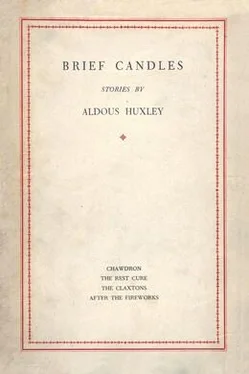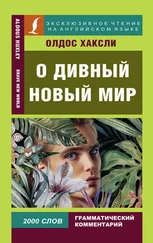Олдос Хаксли - Brief Candles. Four Stories
Здесь есть возможность читать онлайн «Олдос Хаксли - Brief Candles. Four Stories» весь текст электронной книги совершенно бесплатно (целиком полную версию без сокращений). В некоторых случаях можно слушать аудио, скачать через торрент в формате fb2 и присутствует краткое содержание. Год выпуска: 2017, Издательство: epubBooks Classics, Жанр: Классическая проза, на английском языке. Описание произведения, (предисловие) а так же отзывы посетителей доступны на портале библиотеки ЛибКат.
- Название:Brief Candles. Four Stories
- Автор:
- Издательство:epubBooks Classics
- Жанр:
- Год:2017
- ISBN:нет данных
- Рейтинг книги:4 / 5. Голосов: 1
-
Избранное:Добавить в избранное
- Отзывы:
-
Ваша оценка:
- 80
- 1
- 2
- 3
- 4
- 5
Brief Candles. Four Stories: краткое содержание, описание и аннотация
Предлагаем к чтению аннотацию, описание, краткое содержание или предисловие (зависит от того, что написал сам автор книги «Brief Candles. Four Stories»). Если вы не нашли необходимую информацию о книге — напишите в комментариях, мы постараемся отыскать её.
Brief Candles. Four Stories — читать онлайн бесплатно полную книгу (весь текст) целиком
Ниже представлен текст книги, разбитый по страницам. Система сохранения места последней прочитанной страницы, позволяет с удобством читать онлайн бесплатно книгу «Brief Candles. Four Stories», без необходимости каждый раз заново искать на чём Вы остановились. Поставьте закладку, и сможете в любой момент перейти на страницу, на которой закончили чтение.
Интервал:
Закладка:
‘June 28th. When I saw M. at lunch today, I told him I didn’t really know if I liked his poem, I mean apart from literature, and he said, yes, perhaps the young are more romantic than they think, which rather annoyed me, because I believe he imagined I was shocked, which is too ridiculous. All the same, I don’t like it.’
Pamela sighed and shut her eyes, so as to be able to think more privately, without distractions. From this distance of time she could see all that had happened in perspective, as it were, and as a whole. It was her pride, she could see, her fear of looking ridiculously romantic that had changed the quality of her feelings towards Miles—a pride and a fear on which he had played, deliberately. She had given herself with passion and desperately, tragically, as she imagined that Joan would have desperately given herself, at first sight, to a reluctant Walter. But the love he had offered her in return was a thing of laughter and frank, admitted sensuality, was a gay and easy companionship enriched, but uncomplicated, by pleasure. From the first he had refused to come up to her emotional level. From the first he had taken it for granted—and his taking it for granted was in itself an act of moral compulsion—that she should descend to his. And she had descended—reluctantly at first, but afterwards without a struggle. For she came to realize, almost suddenly, that after all she didn’t really love him in the tragically passionate way she had supposed she loved him. In a propitious emotional climate her belief that she was a despairing Joan might perhaps have survived, at any rate for a time. But it was a hot–house growth of the imagination; in the cool dry air of his laughter and cheerfully cynical frankness it had withered. And all at once she had found herself, not satisfied, indeed, with what he offered, but superficially content. She returned him what he gave. Less even than he gave. For soon it became apparent to her that their roles were being reversed, that the desperate one was no longer herself, but Miles. For ‘desperate’—that was the only word to describe the quality of his desires. From light and gay—and perhaps, she thought, the lightness had been forced, the gaiety fabricated for the occasion as a defence against the tragical vehemence of her attack and own desires—his sensuality had become heavy, serious, intense. She had found herself the object of a kind of focused rage. It had been frightening sometimes, frightening and rather humiliating; for she had often felt that, so far as he was concerned, she wasn’t there at all; that the body between those strong, those ruthless and yet delicate, erudite, subtly intelligent hands of his, that were like a surgeon’s or a sculptor’s hands, was not her body, was no one’s body, indeed, but a kind of abstraction, tangible, yes, desperately tangible, but still an abstraction. She would have liked to rebel; but the surgeon was a master of his craft, the sculptor’s fingers were delicately learned and intelligent. He had the art to overcome her reluctances, to infect her with some of his strange, concentrated seriousness. Against her will. In the intervals he resumed his old manner; but the laughter was apt to be bitter and spiteful, there was a mocking brutality in the frankness.
Pamela squeezed her eyes more tightly shut and shook her head, frowning at her memories. For distraction she turned back to her diary.
‘June 30th. Lunched with Guy, who was really rather tiresome, because what is more boring than somebody being in love with you, when you’re not in love with them? Which I told him quite frankly, and I could see he was dreadfully upset, but what was I to do?’
Poor Guy! she thought, and she was indignant, not with herself, but with Fanning. She turned over several pages. It was July now and they were at Ostia for the bathing. It was at Ostia that that desperate seriousness had come into his desire. The long hot hours of the siesta were propitious to his earnest madness. Propitious also to his talents, for he worked well in the heat. Behind her lowered eyelids Pamela had a vision of him sitting at his table, stripped to a pair of shorts, sitting there, pen in hand, in the next room and with an open door between them, but somehow at an infinite distance. Terrifyingly remote, a stranger more foreign for being known so well, the inhabitant of other worlds to which she had no access. They were worlds which she was already beginning to hate. His books were splendid, of course; still, it wasn’t much fun being with a man who, for half the time, wasn’t there at all. She saw him sitting there, a beautiful naked stranger, brown and wiry, with a face like brown marble, stonily focused on his paper. And then suddenly this stranger rose and came towards her through the door, across the room. ‘Well?’ she heard herself saying. But the stranger did not answer. Sitting down on the edge of her bed, he took the sewing out of her hands and threw it aside on to the dressing–table. She tried to protest, but he laid a hand on her mouth. Wordlessly he shook his head. Then, uncovering her mouth, he kissed her. Under his surgeon’s, his sculptor’s hands, her body was moulded to a symbol of pleasure. His face was focused and intent, but not on her, on something else, and serious, serious, like a martyr’s, like a mathematician’s, like a criminal’s. An hour later he was back at his table in the next room, in the next world, remote, a stranger once again—but he had never ceased to be a stranger.
Pamela turned over two or three more pages. On July 12th they went sailing and she had felt sick; Miles had been provokingly well all the time. The whole of the sixteenth had been spent in Rome. On the nineteenth they drove to Cerveteri to see the Etruscan tombs. She had been furious with him, because he had put out the lamp and made horrible noises in the cold sepulchral darkness, underground—furious with terror, for she hated the dark.
Impatiently Pamela went on turning the pages. There was no point in reading; none of the really important things were recorded. Of the earnest madness of his love–making, of those hands, that reluctantly suffered pleasure she hadn’t been able to bring herself to write. And yet those were the things that mattered. She remembered how she had tried to imagine that she was like her namesake of Pastures New —the fatal woman whose cool detachment gives her such power over her lovers. But the facts had proved too stubborn; it was simply impossible for her to pretend that this handsome fancy–picture was her portrait. The days flicked past under her thumb.
‘July 30th. On the beach this morning we met some friends of M.’s, a journalist called Pedder, who has just come to Rome as correspondent for some paper or other, and his wife, rather awful, I thought, both of them, but M. seemed to be extraordinarily pleased to see them, and they bathed with us and afterwards came and had lunch at our hotel, which was rather boring so far as I was concerned, because they talked a lot about people I didn’t know, and then there was a long discussion about politics and history and so forth, too high–brow, but what was intolerable was that the woman thought she ought to be kind and talk to me meanwhile about something I could understand, so she talked about shops in Rome and the best places for getting clothes, which was rather ridiculous, as she’s obviously one of those absurd arty women, who appeared in M.’s novels as young girls just before and during the War, so advanced in those days, with extraordinary coloured stockings and frocks like pictures by Augustus John. Anyhow, what she was wearing at lunch was really too fancy–dress, and really at her age one ought to have a little more sense of the decencies, because she must have been quite thirty–five. So that the idea of talking about smart shops in Rome was quite ludicrous to start with, and anyhow it was so insulting to me, because it implied that I was too young and half–witted to be able to take an interest in their beastly conversation. But afterwards, apropos of some philosophical theory or other, M. began talking about his opium smoking, and he told them all the things he’d told me and a lot more besides, and it made me feel very uncomfortable and then miserable and rather angry, because I thought it was only me he talked to like that, so confidentially, but now I see he makes confidences to everybody and it’s not a sign of his being particularly fond of a person, or in love with them, or anything like that. Which made me realize that I’m even less important to him than I thought, and I found I minded much more than I expected I should mind, because I thought I’d got past minding. But I do mind.’
Читать дальшеИнтервал:
Закладка:
Похожие книги на «Brief Candles. Four Stories»
Представляем Вашему вниманию похожие книги на «Brief Candles. Four Stories» списком для выбора. Мы отобрали схожую по названию и смыслу литературу в надежде предоставить читателям больше вариантов отыскать новые, интересные, ещё непрочитанные произведения.
Обсуждение, отзывы о книге «Brief Candles. Four Stories» и просто собственные мнения читателей. Оставьте ваши комментарии, напишите, что Вы думаете о произведении, его смысле или главных героях. Укажите что конкретно понравилось, а что нет, и почему Вы так считаете.



![Олдос Хаксли - О дивный новый мир [Прекрасный новый мир]](/books/11834/oldos-haksli-o-divnyj-novyj-mir-prekrasnyj-novyj-thumb.webp)






